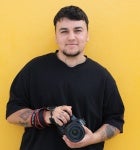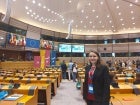Breadcrumb
Stories
Topic
- Show all (1276)
- Men and boys (masculinity) (-) (12)
- Gender wage gap (-) (4)
- Health (-) (4)
- Ending violence against women and girls (72)
- Gender equality and women’s empowerment (45)
- Anti-violence interventions (41)
- Gender discrimination (38)
- Gender equality and inequality (38)
- Domestic violence/interpersonal violence (36)
- Access to justice and legal protection (33)
- Legal assistance (29)
- Laws, legislation (26)
- Gender-responsive budgeting (24)
- Primary prevention (24)
- Sexual harassment (24)
- Feminicide/femicide (23)
- Service delivery (23)
- Economic empowerment (22)
- Rape/sexual assault (21)
- Employment (20)
- Shelters (20)
- Rural women (19)
- Entrepreneurship (18)
- Decision-making (16)
- Youth (16)
- Gender power relations (15)
- Women’s rights (15)
- COVID-19 (14)
- Financing for gender equality (13)
- Gender mainstreaming (13)
- Civil society (12)
- Gender, culture and society (12)
- Political empowerment (12)
- Access to basic services (11)
- Adolescents (11)
- Businesses and foundations (11)
- Girls (11)
- Human rights (11)
- UNiTE campaign (11)
- Beijing Platform for Action (10)
- Civil society participation (10)
- Peace and security (10)
- Safe Cities and Safe Public Spaces (10)
- Training (10)
- Women with disabilities (10)
- Convention on the Elimination of All Forms of Discrimination against Women (CEDAW) (9)
- Financial resources (9)
- Information and communications technology (ICT) (9)
- Leadership and political participation (9)
- National planning (9)
- Partnerships (9)
- Gender stereotypes (8)
- Governance (8)
- Innovation and technology (8)
- Institutional mechanisms (8)
- Peacebuilding (8)
- Social protection (8)
- Women farmers (8)
- Citizen engagement (7)
- Gender statistics (7)
- Generation Equality (7)
- Government contributors (7)
- Productive resources (7)
- Religion (7)
- Science and technology for development (7)
- Sports (7)
- Trafficking/sexual exploitation (7)
- Women’s movements (7)
- 2030 Agenda for Sustainable Development (6)
- Child marriage (6)
- Communications and media (6)
- Electoral systems and processes (6)
- Lesbian, gay, bisexual, transgender, intersex (LGBT) rights (6)
- Markets (6)
- Political violence (6)
- Sex-disaggregated data (6)
- Sustainable Development Goals (SDGs) (6)
- Unpaid work (6)
- Accountability (5)
- Gender data production and collection (5)
- Governance and national planning (5)
- Rural development (5)
- Traditional media (5)
- Constitutions and legal reform (4)
- Gender data gaps (4)
- Gender data use and accessibility (4)
- Intergovernmental processes (4)
- Land and property (4)
- New media (4)
- Poverty (4)
- Public administration (4)
- Rule of law (4)
- Schooling (4)
- Accountability in the UN system (3)
- Climate change (3)
- Crisis response and recovery (3)
- Education (3)
- Environmental protection (3)
- Gender equality indicators (3)
- Health care services (3)
- Inheritance rights (3)
- Living conditions (3)
- Media leadership (3)
- National mechanisms (3)
- National statistical systems (3)
- Parliamentary development (3)
- UN Security Council resolution 1325 (3)
- UN system coordination (3)
- Capacity development (2)
- Coordination, knowledge management (2)
- Disaster risk reduction (2)
- Food security (2)
- Fundamental freedoms (2)
- Fund for Gender Equality (2)
- Harmful practices (2)
- Humanitarian action (2)
- Human rights–based approach (2)
- Macroeconomic policies (2)
- Monitoring and evaluation (2)
- Planning and monitoring (2)
- Sexual and reproductive health and rights (2)
- UN Security Council resolutions (2)
- Urban development (2)
- Åsa Regnér, Deputy Executive Director for Policy, Programme, Civil Society and Intergovernmental Support (1)
- Children’s rights (1)
- Commission on the Status of Women (1)
- Executive Director (1)
- Financial and economic crisis (1)
- Green economy (1)
- Literacy (1)
- Local development (1)
- Maternal health (1)
- Migration (1)
- Monitoring, evaluation and reporting (1)
- Peace processes (1)
- Public sector reform (1)
- Sexuality (1)
- Temporary special measures, affirmative action (1)
- UN Trust Fund to End Violence against Women (1)
Region
Country
1 - 20 of 20 Results
Date:
David Cuka, a 31-year-old trailblazer from Tirana, Albania, joined the UN Women's "Imagine" campaign aiming to raise awareness and challenge cultural stereotypes and gender-based discrimination in Albania and the Western Balkans.
Date:
“Women and girls in Albania face significant underrepresentation and limited participation in sports due to rooted gender stereotypes, inadequate funding, and biased media portrayal”. These are some of the key findings from the "Gender Equality and Women's Participation in Sports in Albania" assessment, conducted by UN Women.
Date:
Young peacebuilders from the Western Balkans participated in a two-day training to strengthen their capacities on the Women, Peace and Security (WPS) and Youth, Peace and Security (YPS) agendas.
Date:
On the occasion of International Women’s Day, UN Women and students of the Faculty of Social Sciences in Albania launched a campaign to tackle gender stereotypes and discrimination, in partnership with Sophie Caffe, a popular coffee shop chain in the country. The initiative won first prize in a student “bootcamp” organized by UN Women as part of the joint UN programme "Leave No One Behind”.
Date:
Ema Meçaj is a 19-year-old activist from Albania, currently pursuing a degree in medicine at the University of Medicine in Tirana. A dedicated advocate for human rights, gender equality, and climate action, she recently co-moderated the regional youth consultation from December 13 to 14, 2023, in preparation for the 68th session of the Commission on the Status of Women (CSW68). In this Interview, Ema Meçaj reflects on the youth consultations, outlines the key issues for this year’s CSW, and emphasizes the vital role of youth in advancing the gender equality agenda.
Date:
Toxic masculinities, rigid gender stereotypes, hate speech and media representation of traditional gender roles increase the risk of violence, particularly against women, which is considered to be the most widespread form of violence throughout the region – according to a new research supported by UN Women.
Date:
Fake news, misinformation, and hate speech are causing significant harm to mental health, exacerbating social divisions, and eroding trust in public institutions throughout the Western Balkans. Marginalized groups, particularly women and girls, are frequently targeted by hate speech. Of particular concern is the role of social media, which has become a fertile breeding ground for disinformation.
Date:
More than fifty young people from the region engaged virtually in a constructive dialogue addressing the root causes of gender inequalities and its implication for social cohesion. This was the first regional consultation organized by UN Women as part of UN’s ‘Youth 4 Inclusion, Equality & Trust’ project supported by the UN Secretary-General’s Peacebuilding Fund, contributing to promoting gender equality as a driver for social cohesion and reconciliation in the Region.
Date:
Interview with Michele Ribotta, Head of the UN Gender Group and UN Women Representative in Albania
Date:
On 24 February 2023, the Government of Albania and UN Women hosted a sub-regional consultation for the Western Balkans and Türkiye, in preparation for the 67th session of the Commission on the Status of Women (CSW67). The consultation provided an opportunity to discuss the gender gap in digital access, women's underrepresentation in certain professions, women’s entrepreneurship, decision-making in the digital transformation, as well as online discrimination and violence in the region.
Date:
FED Invest is amongst the latest private companies in Albania signing the Women’s Empowerment Principles (WEPs). FED Invest, a financial services company, joined the group of private sector partners that are now formally promoting gender equality and women’s empowerment in the workplace, marketplace, and community.
Date:
As a result of continuous lobbying efforts, Empowerment through Self Defense has now become part of the first National Strategy for Youth and its Action Plan 2022-2029 which was approved in October of the current year. This innovative approach addresses gender equality by helping build healthy interpersonal relations and empowers girls and boys.
Date:
More than ninety women and girls from four regions of Albania participated in a fair event organized by UN Women and supported by the Albanian Network for Rural Development. They discussed the challenges faced by women in the agri-food sector in the presence of representatives from the Ministry of Agriculture and Rural Development, the Italian Agency for Development Cooperation and Municipality of Elbasan officials.
Date:
When she was born 35 years ago her father cried because he wished his second child would be a boy. But throughout her life, Arjeta Puca, has proven to anyone who told her ‘You can’t do it because you are a girl’, that she can do anything.
Date:
Since September 2021, UN Women has been working closely with UNHCR and CARITAS in Albania to ensure that migrant and asylum-seeking women and girls, in particular those at high risk of being subjected to violence, are properly identified and welcomed in the country.
Date:
Over 1200 students around Albania were trained boosting their the self-esteem and strengthening their safety.
Date:
From photo exhibitions and festivals to student discussions and private sector commitments, UN Women, in collaboration with local government and development partners, organized a series of topical events by to commemorate International Women’s Day, in the week of 3-11 March.
Date:
Women’s organizations across Eastern Europe and Central Asia urged governments and development partners to recognize the unique and vital needs of women and girls in pandemic response and recovery efforts. Activists warned the international community that the world risks a roll back in women’s rights if necessary efforts are not urgently undertaken.
Date:
Women are playing a key role—often disproportionate to men—in responding to the disease, as frontline healthcare workers, as well as care givers at home. Experience of other disease outbreaks shows that they have the highest risk to be infected. Almost 12 per cent of Albania’s reported cases of coronavirus have been health workers, but no fatalities have been reported yet.
Date:
A week since The World Health Organization (WHO) declared COVID-19 as a pandemic, the social impact of the Corona Virus is hitting women hard, around the world. Globally, women make up 70 per cent of workers in the health and social sector, and they do three times as much unpaid care work at home as men. As first responders, frontline health workers, primary care givers at home and community mobilizers, women are at increased risk of exposure to the virus. They are also playing a disproportionate role in responding to the disease.
1 - 20 of 20 Results
















